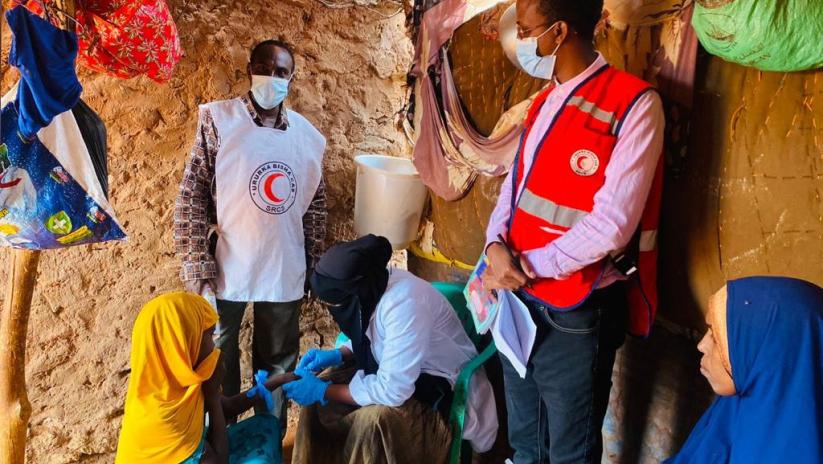
The Somali Red Crescent Society (SRCS) and the Norwegian Red Cross have implemented CBS activities in several regions in Somalia since 2018. In 2021, the SRCS Galkayo branch kicked off their community health project, including community-based surveillance (CBS) to reduce the ongoing high risk of disease outbreaks, and strengthen early warning, alert, and response to outbreaks at the community level. The high risk for outbreaks in these locations is due to several factors including limited access to health care, poor living and hygiene conditions, and low vaccination coverage. SRCS is collaborating with the Ministry of Health (MoH) since the beginning of the project and involved them in the assessment, design, planning, and implementation phase.
CBS is implemented as a combination of a syndromic indicator-based and event-based surveillance approach for epidemic preparedness and response. The SRCS branch has trained 119 volunteers in 54 locations – urban and rural – since 2021, in the detection and reporting of signs and symptoms of acute watery diarrhoea; fever and rash; fever, cough/difficulty breathing and tiredness; and acute flaccid paralysis. In addition, the health risk of cluster of unusual illnesses or deaths in people has been included to detect potential other new or rare epidemics in this region.
Volunteers are informed by community members about sick people or identify them while doing their routine community health promotion activities. Volunteers then report health risks from the community via coded SMS to the CBS platform Nyss. Nyss was developed by Red Cross Red Crescent Movement partners as a custom system for CBS that can be used in the operational contexts National Red Cross and Red Crescent Societies operate. Nyss is a web-based platform which enables real-time reporting, notification, data analysis and programme management. The system also enables information sharing with stakeholders, particularly with the MoH for further investigation and recording in their own surveillance tools (e.g., EWARN, DHIS2). CBS with Nyss aims to promote early action to limit the spread of an outbreak.
Since implementation began, several outbreaks have been detected, one of the most recent being the detection of rubella:
On the 17th of July 2023, SRCS volunteers based in a village about 15km away from SRCS Ba’adweyn clinic in Mudug region reported two children with mild symptoms of fever and rash via SMS to the Nyss platform. They had been vaccinated against measles during a previous vaccination campaign conducted by the SRCS mobile clinics in collaboration with MoH after a measles outbreak had been detected. Additionally, the SRCS volunteers conducted health awareness activities in the community to encourage preventive measures to avoid the spread of diseases. On the 29th of July, the volunteer detected four other children with similar symptoms in the same village and reported these through the Nyss platform again. After a supervisor cross-checked the alert and confirmed it matched the community case definition, SRCS escalated the alert that same day to the State Ministry of Health and a response team was immediately organized. On the 30th of July 2023, the outbreak investigation team, consisting of SRCS Community Health team, MoH surveillance officer and laboratory technician, visited the village where the alerts were sent from. They collected samples from the affected children to test for measles, but the results were negative. Therefore, they tested further for rubella which was then confirmed positive through laboratory testing. Since no combined measles, mumps, rubella vaccine has been available in the State, SRCS volunteers responded to the outbreak through community awareness interventions. SRCS has been in discussion with MoH on further actions including advocacy to aquire the respective vaccines (MMR) and diagnostic tests from WHO.
For Mumps and Rubella the advocacy was successful: A vaccine campaign for the combined Measles, Mumps, Rubella (MMR) vaccine is planned to be implemented in Puntland State in 2024.





